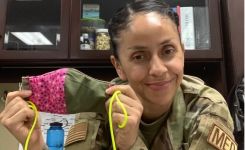- Defense Language Institute English Language Center
- Presenters share unique “Diversity of Cultures”...
Presenters share unique “Diversity of Cultures” at the DLI Holiday Social
Diversity.JPG
By Annette D. Janetzke
Public Affairs, DLI
This year the DLI AMIGO Holiday Reception had something new. Five volunteers presented a theme of "Diversity of Cultures." They explained celebration of a special holiday in their country. The present-ers began with music relating to their culture and slides depicting the celebration as they talked.
The first presenter was 2nd Lt. Ratana Serey from Cambodia. She presented Hindu celebration of Khmer (meaning enter New Year) which lasts for three days in the middle of April. The first day they celebrate, "Old Year Gone, New Year Here," by welcoming the new angel with prayer, food, and decorations. The second date is the, "Day of Giving," when children give money and clothing to adults. The third day is called the, "New Beginning," when they go to the Temple or Pagoda to pray and receive blessings from the monks. During this time they clean the Buddha statue and their elders with perfumed water. This action washes away the bad (sins) and brings good luck, happiness and prosperity.
Serey was followed by Cpt. Chuc Thi Ngo from Vietnam. Before the New Year celebration, they clean the graves of their ancestors as a sign of respect. New Year is celebrated on the first day of the lunar calendar by preparing feasts to offer to ancestors and by worshiping at the family alter followed by a big family meal with all the relatives. They also give lucky money which is a wish for good luck, happi-ness, and good health
during the upcoming year. On the third day they visit the Temple in order to forget about the troubles of the past year and hope for a better new year.
Next was 1st Lt. Cyril Temu from Tanzania. He presented the celebration of Christianity at Christmas time which he states is a magical time of the year. They deco-rate their home with Christ-mas trees and also put up lights. Churches are decorated with flowers and votive candles as they hold special midnight mass on Christmas Eve. Gift giving is not important, rather than the gathering of relatives. They slaughter a goat and prepare it as BBQ meat with rice, potatoes, banana stew, fried bananas and salad. This is a time of marriages and church events, such as, a public declaration of Christian faith called confirmation or first communion. The celebration mood last until January when the new school season begins.
Next we heard from Adil Mur-barak Ali Al-Hamdani from Oman who presented the Islam-ic faith and its celebration of Muhammad's birth. Muslims who choose to celebrate his birth do so within the third month of the Islamic calendar year, i.e., Rabee' al Aw-wal. Some families will decorate their home with lights and ban-ners. Families also gather in their homes with their children and read the Quran and stories citing events throughout the prophet's life. And others may gather in mosques for lectures by Imams.
The final speaker was DLI English Instructor, Aaron Deutsch, who presented the Jewish faith as they celebrate Hanukkah. He named his presentation, "Moving beyond the Dreidel." Judas Maccabeus reclaimed The Temple of Jerusalem after the Greeks forbade Jewish worship. Hanukkah is a fairly modest holiday in Israel and many other Jewish communities around the world. Post-Civil War, everyone was adjusting to major social change - urbanization, industrialization. So religious leaders thought sentimental home celebrations would help create stability. Hanukkah also took on important meaning for the two million Jewish immigrants com-ing to the U.S. from Eastern Europe. They wanted an occasion to celebrate in community while Christian immigrants were doing the same thing around Christmas. The foods for the holiday would be Latkes (potato pancakes) and Jelly doughnuts. They also eat chocolate coins called Gelt and play dreidel games.


